This is Not Functional Medicine. So, What is Innovative Medicine?
Innovative Medicine is frequently mistaken for functional medicine. In fact, it’s often mistaken for many different approaches that don’t quite do it justice. And while functional medicine, integrative medicine, energy medicine, and a host of other types of medicine have made many advances in overall therapeutic and health practices, Innovative Medicine is in a league of its own. For the sake of this article, I’ll be referring to Innovative Medicine as the unique medical approach to healing, and not to the organization and company of the same name.
As such, I often get asked the question,
“What is the difference between Innovative Medicine and functional medicine?”
Surprisingly, Innovative Medicine incorporates functional medicine, as well as many other components from the medical spectrum. I’ll explore the differences between these two in more detail below.
But first, let’s look at all the therapeutic options and different approaches to medicine to get a better understanding of the whole spectrum. I find this incredibly important for setting the stage to better understand the differences of many different types of medical approaches. It’s a somewhat crowded field, so we’ll navigate briefly through it together.
The Full Spectrum of Medicine
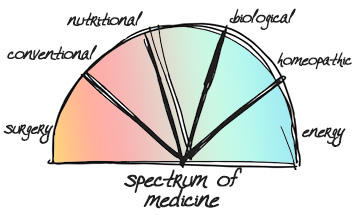
If we were to break down the different clinical options of what’s out there in medicine and plot it on a spectrum as if it were political positions on an axis, it’d look something like the above.
To the left, you’d have conventional medicine. To the right, alternative medicine. I’d say to the far left you’d find your hardcore fanatical surgeons that just want to cut everyone open, and to the far right are the spiritual zealots who could care less about the human body and biochemistry and want to live on a higher plane, but they’re both out there on the very fringes of this spectrum.
First, let me address the left side of this spectrum, as most of us are most familiar with this conventional approach. Traditionally, conventional (orthodox) medicine has led the way toward medical treatment and better health. Doctors and healthcare providers alleviate the symptoms, manage the disease, and do so with a host of pharmaceutical and surgical options. But the problem with using solely conventional medicine, as I learned following my own father’s career as a conventional physician, is that it normally only offers a band-aid solution for chronic disease. Don’t get me wrong – it’s an absolutely fantastic approach for acute health crises. Broke your bone in a car accident? Cut your finger off in a freak home renovation mistake? Conventional medicine has you covered. But when it comes to chronic and complex conditions, there’s definitely room for improvement (the statistics prove that). And while these orthodox approaches do provide the means to help a person feel better, they don’t necessarily solve the root of the problem.
For instance, you’re given daily pills to take for your high blood pressure. And these pills will absolutely help keep your blood pressure levels down, at least for some period of time. However, there is still the question, What is causing your high blood pressure in the first place? Is it your diet? Is it your lifestyle? Is it stress? How about an infection (yes, that can cause it)? It doesn’t exactly pinpoint what is really going on or take action to solve the root problem – which is where functional medicine comes in.
Now let’s move to a slightly more centric position on the spectrum. This is where things like nutrition, lifestyle and environmental factors hold more weight. It’s also where functional medicine sits. Here is where healthcare professionals assess the interactions between a person’s genetics, environment, and lifestyle that may ultimately be contributing to their pain or illness. Instead of turning directly to a pharmaceutical drug, functional practitioners will prescribe nutritional supplements and lifestyle/diet changes. It’s an awesome step in the right section, but (I know, there’s almost always a but)…
Functional medicine still has some limitations as it does not consider (or greatly undervalues) things like energy, spirituality, and some psycho-emotional aspects. For example, there’s a whole segment of energetic, emotional and spiritual or consciousness-based therapies that are often overlooked. We’ll jump back into that a little later.
If we were to move further along the spectrum and start to get really close to the center, you’d find European Biological Medicine. Here’s where functional medicine meets a more traditional natural approach. You’ll start to hear a lot about ‘self-healing’ in European Biological Medicine. What that means is that the practitioner will provide remedies such as homeopathic, herbal, or spagyric remedies to assist the body in healing itself. Sounds great right? But there’s still a downside, as very little from the right hand of the spectrum is utilized here, and therefore a large area of potential healing options are missed.
When we enter the right side of the spectrum, we start to talk about energy medicine. That’s not energy as in you’re full of physical energy from drinking coffee, this is the unseen energy that governs nature and is the basis of Einstein’s work. One of the most common modalities that many have heard of here is Traditional Chinese Medicine (TCM). An ancient practice, TCM involves acupuncture, massage, herbal remedies, cupping, acupressure, and exercise variations – some of which have been around for thousands of years. TCM strives to restore balance of the ‘qi’ – the body’s energy – to heal an individual’s ailments. This is where medicine and healing are starting to be found in the esoteric and energetic realm. And while science hasn’t exactly uncovered how some of these methods work, many individuals attribute TCM as a major factor in guiding them toward optimal health and we can’t overlook the usefulness.
If you’re looking a little further down the spectrum, Reiki is another form of energy healing. Reiki also guides the ‘qi.’ Energy is thought to transfer from the provider’s hands or palms into the client. Ultimately, this transfer of energy is thought to help restore emotional and physiological imbalances.
And then, there are psycho-emotional therapies. There are an array of subsets in this category. For example, certain therapies may lean toward a more spiritual approach where past life regression is explored. Other therapies or counseling subsets may dive into your mental well-being and offer a safe space to talk through any stressors or factors causing emotional distress.
So where does Innovative Medicine fall? It’s pretty much somewhere right smack in the middle. It is the perfect balance and mix of conventional, functional, European, psycho-emotional, spiritual, and energy healing. In turn, it offers an extensive toolkit. This toolkit enables healthcare providers to propose the best treatment possible for every patient in a highly personalized manner, and would look something like this:

A Deeper Look at Functional Medicine
As aforementioned, functional medicine aims to find the root cause of an individual’s grievance as opposed to just treating the symptoms by more advanced laboratory tests and data analysis. It’s considered a holistic approach – which in a way, it is.
It is a science and evidence-based approach that takes data collection to the next level. Healthcare providers look at how the body’s systems, organs, and processes interact with each other. They look to understand the genetic, biochemical, and lifestyle factors impacting a person’s health. From there, they use data to determine a treatment plan specific to the individual.
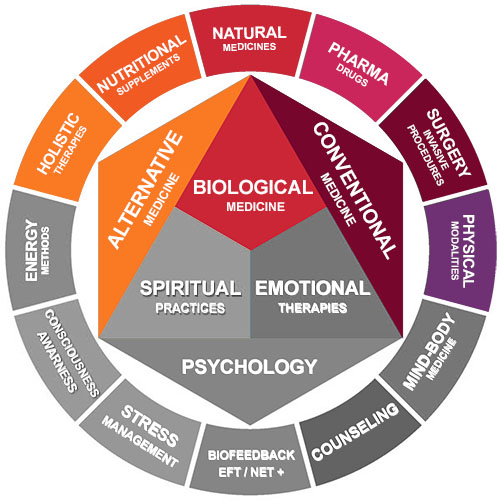
To better illustrate the functional medicine approach, let’s take the example of a patient with high blood pressure. A functional medicine healthcare provider may prescribe a medication to get the person’s blood pressure levels under control. But at the same time, they’ll address the person’s lifestyle factors. They may ask questions and make recommendations relating to the person’s diet and physical activity levels. They may put them on nutritional supplements and pick up on deficiencies or toxins that are hampering the body. Consequently, the patient may not have to be on blood pressure medication for the rest of their life.
And for some people, functional medicine is enough. If a person’s only problem is that they don’t exercise at all or that they have a poor diet and have some symptoms, then lifestyle factors will absolutely help and likely solve their borderline diabetes problem or possibly high blood pressure issues.
But for some other people, like the chronically ill that make up over 50% of America, it’s probably not enough. The body’s energy circuits, spiritual factors, and psycho-emotional aspects are often left unaddressed. We’re treating the body, but not the mind and spirit. Perhaps the reason a person is overweight is due to a life-long experience of emotional turmoil and distress. They aren’t going to be able to make a lifestyle change with these mental, emotional, and spiritual barriers.
I turned to my co-founder here at Innovative, Dr. Mark Iwanicki, to elaborate on the gap within functional medicine further: “I think the biggest problem with the current functional medical approach is a lack of coordination and integration of the numerous modalities that exist in both the natural as well as allopathic healthcare systems into something that is truly personalized and individualized for each unique patient. The missing link, I believe, in that more complete integration is the concept of bioenergetic compatibility. Innovative Medicine introduces this concept in a definitive way that is truly groundbreaking to the modern notions of health and healing. Many functional docs play lip service to the concepts of energy or energy testing but no concrete, or practical approach has ever been fully put forward that truly utilizes the concept of the human bioenergetic body to the degree that Innovative Medicine’s approach does. By using bioenergetic compatibility we are able to open a doorway into the body of the patient and get the exact answers needed to build a perfect roadmap to healing.”
In other words, the functional medicine toolkit is limited. It’s a step in the right direction, but it’s still missing key variables that lead to optimal health and well-being.

“The missing link, I believe, in that more complete integration is the concept of bioenergetic compatibility. Innovative Medicine introduces this concept in a definitive way that is truly groundbreaking to the modern notions of health and healing. Many functional docs play lip service to the concepts of energy or energy testing but no concrete, or practical approach has ever been fully put forward that truly utilizes the concept of the human bioenergetic body to the degree that Innovative Medicine’s approach does.”
MARK IWANICKI, ND, Lac
What is Innovative Medicine?
I’ve always loved this quote from Dr. Sandeep Budhiraja, a well respected physician in India, to answer the question of what is Innovative Medicine:
“As physicians we come across several challenges in identifying the root cause of the most common diseases –‘lifestyle diseases’, while modern medicine provides us with options to treat the same but to be able to understand the reason behind the disease and address patient concerns we are often faced with several challenges– no clear answers. Combining best of all medical options is the way forward to provide the finest and quality healthcare to the patient. Innovative Medicine is a very personalized and individualized route that gives a more in-depth insight as we dive deep into the root cause of diseases. No singular method can be the best method and for me as a physician, a mix of conventional medicine and biological medicine ensures that I am able to provide the optimum course of treatment and clear answer to my patients.”
“Combining best of all medical options is the way forward to provide the finest and quality healthcare to the patient. Innovative Medicine is a very personalized and individualized route that gives a more in-depth insight as we dive deep into the root cause of diseases. No singular method can be the best method and for me as a physician, a mix of conventional medicine and biological medicine ensures that I am able to provide the optimum course of treatment and clear answer to my patients.”
SANDEEP BUDHIRAJA, MD
Head of Internal Medicine – MAX Healthcare

As you can see from Dr. Budhiraja’s insight, Innovative Medicine fills in the gaps. It draws from and uses all types of medicine that have been viably and clinically proven to improve patient results. Not every individual will need all aspects addressed, but Innovative Medicine takes them into account. Here’s a truth medicine must acknowledge: every person is different. Thus, every person’s health or lack of it manifests in slightly different ways. Innovative Medicine recognizes that, and is the most beneficial way to optimize a person’s health and well-being in a tailored, specific and prioritized manner.
Basis of Treatment
As previously mentioned, functional medicine incorporates a good amount of lab testing and data. But more information doesn’t necessarily mean better outcomes. Too much information may lead to the paradox of choice and confusion due to the complexity and infinite initiation factors that lead to the results one is interpreting.
And don’t get me wrong, data can be a good thing and Innovative Medicine uses lab results as well. Yet, these tests are used as a secondary tool. The main goal is identifying the causes at their source. Have elevated hormonal levels? We want to know precisely WHY, without guessing or making assumptions on the biochemical reference results. Many of these levels cannot be examined or explored via regular lab testing. For instance, a lab test can’t measure emotional stress, EMF, or geopathic stress and its impact on any given patient.
Thus, Innovative Medicine incorporates traditional medicine styles, as well as emerging medicine. Innovative Medicine stays on the front lines of new therapies and new medicinal practices. It’s truly dynamic. And energy therapies and technology are an important part of this. Some people accept them as medicine and viable treatment options – while others don’t. But Innovative Medicine incorporates all varieties of promising procedures and treatments, puts them to the test and clinically applies them to see their worthiness and effectiveness before adding to the toolkit.
Innovative Medicine recognizes that acupuncture, TCM, Reiki, ‘qi’ therapy types, Ayurveda, homeopathy, herbology, emotional techniques, spiritual practices, and therapeutic touch energy therapies benefit certain individuals. It also realizes that great advancements have been made in energy medicine and the application of this ancient wisdom combined with technology and modern discoveries have advanced what is now possible. And although it can’t necessarily be measured via typical lab tests, it doesn’t mean it does not work to heal and would not be an important part of a patient’s personalized treatment program.
These types of therapies are also a step forward away from more traditional and invasive procedures that may not be fully necessary and are normally accompanied with side-effects and risks of complication. As the modern version of the Hippocratic Oath states, “I will remember that there is art to medicine as well as science, and that warmth, sympathy, and understanding may outweigh the surgeon’s knife or the chemist’s drug.” I believe we can group in a whole series of other therapies along with warmth and sympathy before turning to the scalpel or prescription drugs.
For instance – although 50-70 years since abandonment – a lobotomy, for a period of time, was the go-to when it came to treating mental illness. Today, we know better. Continual technological advancements and alternative therapies offer a variety of approaches that don’t involve surgery or possibly, brain damage.
And while surgery is necessary in some cases, medicine is now less limited. We’re blessed with access to more options from around the world that are paving a way toward better treatment and ultimately, a better quality of life.
Imagine a patient comes to a clinic complaining of stomach pains and digestion problems. With the Innovative Medicine toolkit, a doctor won’t only explore the person’s diet. They will inquire into all factors. They’ll tap into the patient’s inner intelligence to see what particular stressors are impacting their health, whether that be physical stressors such as pathogenic infection, or unseen factors such as emotional or electromagnetic stress. In other words, they find the real root cause. As a result, they may not only prescribe a specific supplement to address a deficiency. They may also use specific energy balancing techniques and a particular stress-reduction methods to improve digestion. Treatment may include several different holistic modalities and procedures, but all would be highly tailored to the patient with great specificity, frequency and priority.
The critical takeaway here is that they’ll address the root cause by using a wide-range of tools and personalizing it to the patient. And while some tools may not work for one individual, they may work for another. It’s a scientific and personalized approach to healthcare and overall well-being of the mind, body, and spirit. Innovative Medicine is essentially a unified medical system that guarantees each patient gets the best treatment possible for their unique situation or condition in the most efficient manner while minimizing side-effects and adverse reactions.
Think of the difference between functional and Innovative Medicine like testing the water downstream where a river is wide. At this wide point in the river, potentially, a number of concerning factors are found. And there’s a lot of data to be pulled down there. But then it becomes a cumbersome task where predictive analysis and intellectual guessing are used to come up with hypotheses. A treatment is then based off of these possible hypotheses. This is generally how many medicine types, such as functional medicine, work. Some doctors are very good at their educated guesses, others not so much. And yet others rely on generalized protocols and trial-and-error approaches.
A better approach, in my humble opinion, would involve going to the source of that river – where it originates and is just a small stream of melting ice and collected rain water. At the source, various initiating factors (underlying causes) can be tested with ease. From there, it can be determined what is causing the downstream effects. It doesn’t involve guessing. Instead, you’re relying on concrete answers to establish the definitive cause of the downstream problems. And this is what Innovative Medicine is about.
See how we can help you restore complete health of body, mind & spirit.
We’ll send you special offers and cutting-edge info on how to heal smarter.
The Innovative Medicine Toolkit
Going back to the Hippocratic Oath, “I will remember that I do not treat a fever chart, a cancerous growth, but a sick human being, whose illness may affect the person’s family and economic stability. My responsibility includes these related problems, if I am to care adequately for the sick.” To adequately care for a chronically ill patient of today, you have to address the multitude of causes. And to do that, you need a comprehensive tool kit. That’s where Innovative Medicine shines. It gives every tested modality and therapeutic option a seat at the table. The patient is seated in the middle. There are no specialties or preferences. The most important thing is helping the patient. It doesn’t exclude any therapy. There is no ego, no prejudice, and no preferences or biases.
For instance, if surgery is identified as the best option, then that’s what is done. When you treat the ‘why’ instead of the ‘what,’ you see each patient as a blank canvas, as opposed to grouping them based on diagnosis or symptoms. Again, the patient’s best interests drive this form of medicine.
And the experts agree. Kuba Bryl, LAc, states, “I think that Innovative Medicine is the way medicine is going. It is a very comprehensive assessment where we can know everything in a patient, including the treatment. So, without spending all the money on all the different tests that are out there, you have a tool, and you have a protocol that you follow that will lead you to finding out what’s appropriate to treat in that patient at this particular time. I think this is the future.”
Conventional Medicine
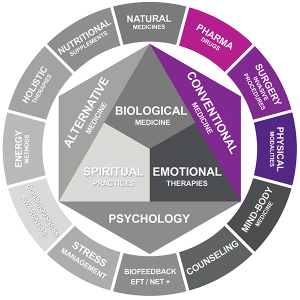
You would think Innovative Medicine would leave out conventional medicine, but that’s simply not true. We honor the amazing advancements in orthodox medicine, and of course, some patients will require a conventional approach to their issues – or a combined approach involving conventional medicine and other methods. As explained above, a healthcare provider may prescribe medication or recommend surgery. Yet, these factors aren’t usually the end all, be all. A combination of treatments and types of medicine also contribute to the eventual recovery and good health of the patient.
Biological Medicine
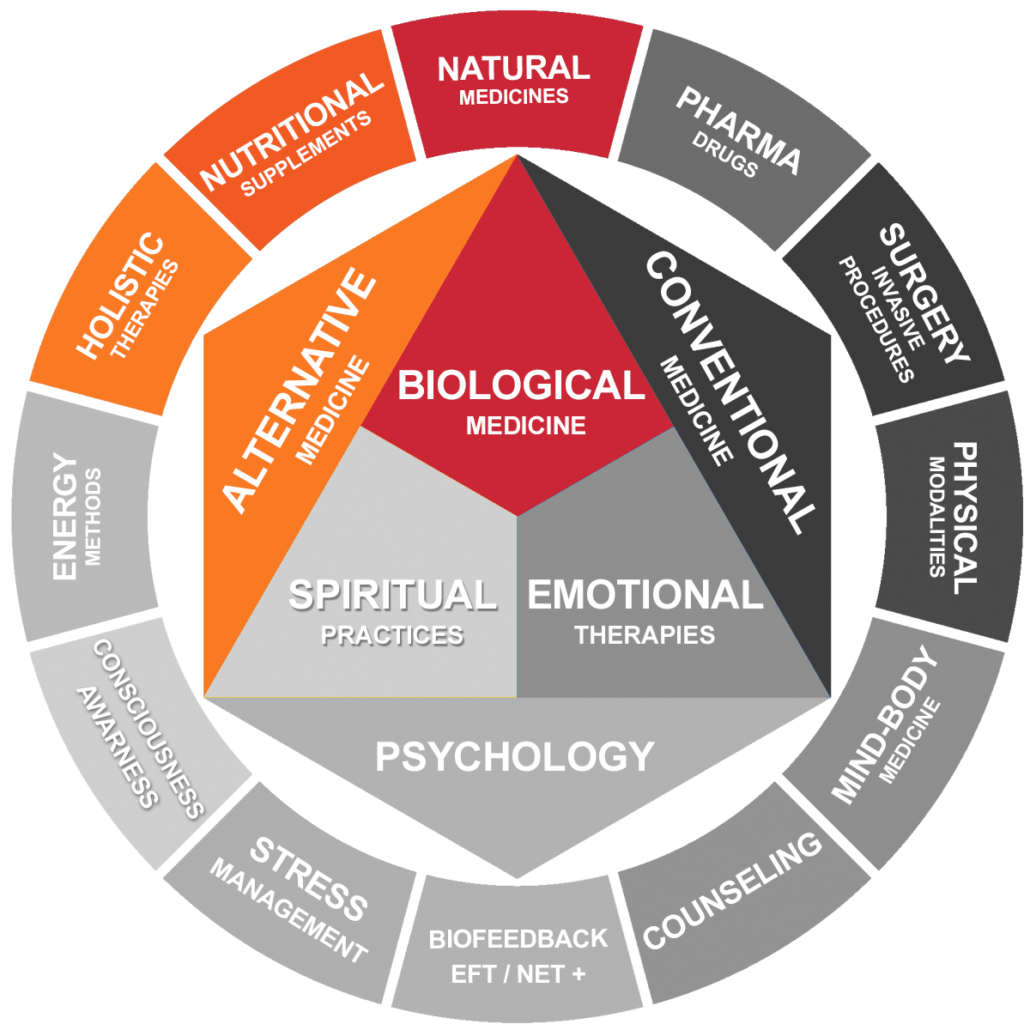
Applying what we know about biology to health factors is undoubtedly important. The body should be looked at as a whole since it functions as a whole. Individual systems, organs, and processes rely on and impact each other. It takes into the perspective that the body can self-regulate – which is not a perspective to be overlooked.
Energy Medicine

Some believe energy medicine is acupuncture or waving hands over the body, but innovative medicine takes a slightly different approach to this part of the toolkit. We consider energy medicine equal to that of other therapies. Various types of energy healing have worked for millions of people. It is also based upon thousands of years of tradition. And although, science can’t prove it or we don’t currently or fully understand it, it doesn’t mean it doesn’t work. Energy medicine plays a part in spiritual, emotional, and mental well-being – all of which are only becoming more recently mainstream.
Psycho-Emotional Therapies

There is an inevitable link between physical and mental health. The human body reacts to emotional and mental stress and distress. And innovative medicine recognizes this. We incorporate a variety of approaches and therapies to include psychological and emotional factors. These factors are often – but not always – entangled with a need for lifestyle adjustments or spiritual therapies.
Spiritual Therapies
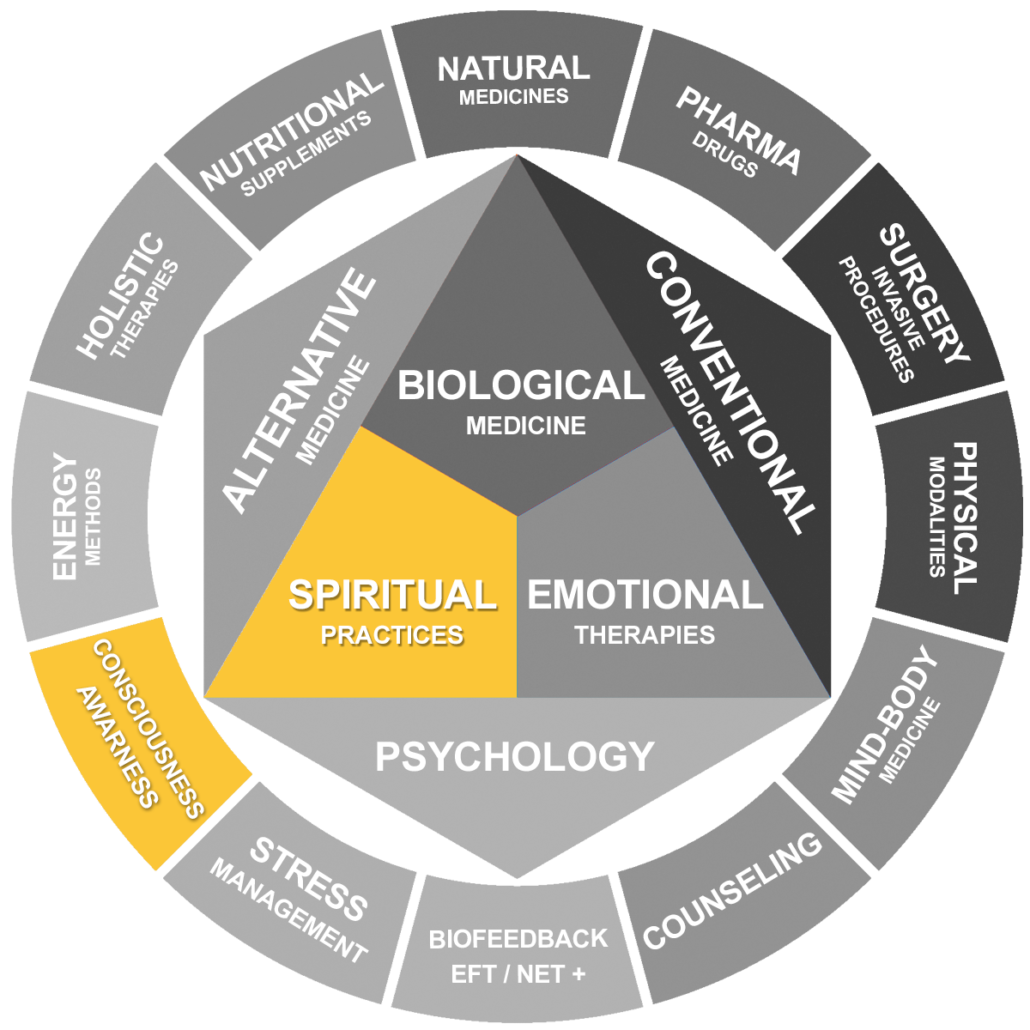
Spiritual therapies may include spiritual counseling, meditation, Ho’oponopono, consciousness practices, and more. This factor is often waved off by healthcare professionals. Yet, spirituality has always been a major aspect in human life. You just have to look at the variety of religions through history to understand its significance. And studies have linked religion to happiness and a sense of purpose. However, it’s not limited to religion. It’s also linked to connections within the universe and an understanding of our existence. Innovative Medicine understands the spiritual association when it comes to happiness and health. Spirituality is closely related to mental well-being. A 2004 study solidifies these ideas. Researchers found stress and depression were linked to a decreased immune response. Thus, these aspects leave the human body susceptible to disease and may be the ultimate cause of one’s illness.
Lifestyle Adjustments
Functional medicine emphasizes lifestyle changes. And Innovative Medicine also considers it an important piece of the puzzle. It can impact a person’s physical, emotional, spiritual, and mental state. In Innovative Medicine, lifestyle factors aren’t limited to diet and exercise. These factors also involve stress-related mechanisms, relationships, and psychological consequences associated with psycho-emotional therapy methods. A sense of purpose or a person’s general happiness may also contribute to disease or illness. Innovative Medicine takes everything into account.

It’s Time for Innovation. It’s Time for Change.
I want to applaud functional medicine for taking a bold step in the right direction and moving away from a limited ‘far-left’ viewpoint. I am not against it, and think there are wonderful functional medicine doctors doing fabulous work and healing people. This article is mainly to show the difference and allow others to gain knowledge. From there, they can make the best decision for their health and ultimately, better their lives.
The post This is Not Functional Medicine. So, What is Innovative Medicine? appeared first on Innovative Medicine.
See how we can help you restore complete health of body, mind & spirit.
Lorem ipsum dolor sit amet, consectetur adipiscing elit, sed do eiusmod tempor incididunt ut labore et